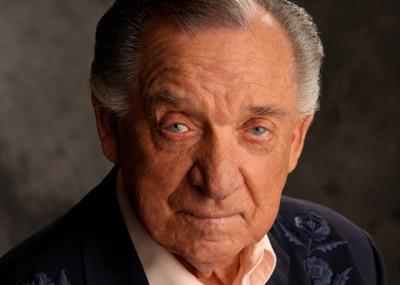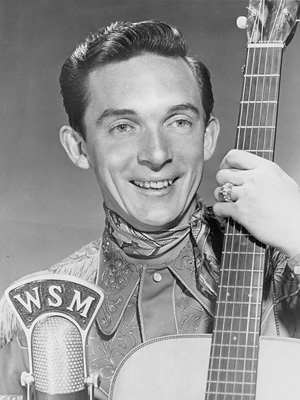

Ray Price
Country Music Hall of Fame member Ray Price has passed away today (Dec. 16) at 4:43 p.m. CT following a long battle with pancreatic cancer. He was 87 years old.
The legendary performer decided last Thursday that he wanted no further medical treatment at the hospital in Tyler, Texas and elected to return to his Mt. Pleasant, Texas ranch to die.
“I am at peace,” he said. “I love Jesus. I’m going to be just fine. Don’t worry about me. I’ll see you again one day.”
As a vocalist, Price defined two major eras of country-music history. His barroom “shuffle” classics made him a master of the honky-tonk style of the early 1950s. In the 1960s and 1970s, he became a cornerstone of the Nashville Sound era via a string of smooth ballads. In addition, his recorded repertoire includes a slew of country standards.
During his eight-decade career, he placed more than 100 titles on the country charts. Forty-six of them became top-10 smash hits, and eight of those went to No. 1.
His band served as a career launchpad for such country greats as Willie Nelson, Roger Miller and Johnny Paycheck. He was a key figure in the rise of Nashville Songwriters Hall of Fame members Bill Anderson, Harlan Howard, Hank Cochran, Jim Weatherly and more.
Ray Noble Price was born in Perryville, TX in 1926 and was raised in Dallas. Following service in the Marine Corps during World War II, he began his professional singing career in 1948 on KRBC in Abilene. The following year, he joined the cast of the Big D Jamboree in Dallas. He began his recording career in 1950 on the Nashville independent label Bullet Records.
Signed by Columbia Records, Price moved to Music City. He became friends with his idol, superstar Hank Williams. The two men roomed together when Williams was between marriages, and Williams urged the Grand Ole Opry to sign Price to its cast in 1952. After Williams died on New Year’s Day 1953, Price inherited Hank’s Drifting Cowboys band and renamed them his Cherokee Cowboys.
By then, he had already had his first taste of success. In 1952, Price climbed the charts with the honky-tonk hits “Talk to Your Heart” and “Don’t Let the Stars Get in Your Eyes.” He co-wrote Lefty Frizzell’s 1952 smash “Give Me More, More, More.” In 1954 came Price’s singing sensations “I’ll Be There (If You Ever Want Me)” and “Release Me.”
Price scored his first No. 1 hit with the honky-tonk landmark “Crazy Arms” in 1956. That recording is now in the Grammy Hall of Fame.
He launched Bill Anderson’s hit songwriting career with 1958’s “City Lights.” He boosted the fortunes of songwriter Harlan Howard with 1959’s “Heartaches By the Number,” of Mel Tillis with 1961’s “Heart Over Mind” and of Roger Miller with 1959’s “Invitation to the Blues.”
Other classics Price created during this first phase of his career include “I’ve Got a New Heartache” (1956), “My Shoes Keep Walking Back to You” (1957), “I Wish I Could Fall in Love Today” (1960) and “The Same Old Me” (1960).
He created Pamper Music, the publishing company that introduced Howard, Hank Cochran and Willie Nelson, among others. Both Nelson and Miller served time as members of his band in the early 1960s.
With the coming of the Nashville Sound era, Price re-invented himself as a tuxedo-suited crooner and scored some of the most massive hits of his career. This process began with his version of Nelson’s “Night Life” in 1963, Tillis’s “Burning Memories” in 1964 and Cochran’s “Make the World Go Away” (1963), “That’s All That Matters” (1964), “Don’t You Ever Get Tired of Hurting Me” (1965) and “A Way to Survive” (1966).
Price’s 1967 hit version of “Danny Boy” was considered controversial because it incorporated a full orchestral backing, rather than fiddles. Other Nashville Sound landmarks he sang included “Please Talk to My Heart” (1964), “She Wears My Ring” (1968), “You Wouldn’t Know Love” (1970) and “Take Me As I Am (Or Let Me Go)” (1968). “Touch My Heart,” a 1966 hit, was co-written by another of his former band members, Johnny Paycheck.
Price left Nashville and moved back to Texas in 1969. But he continued to record in Music City.
He introduced Kris Kristofferson’s immortal “For the Good Times” in 1970. It became a big pop-crossover hit and won him a Grammy Award as well as two ACM honors. “I Won’t Mention It Again” (1971) and “She’s Got to Be a Saint” (1972) also hit No. 1 for the singer. The I Won’t Mention It Again LP was named Album of the Year by the CMA in 1971.
Price began publishing the songs of Jim Weatherly in the 1970s and released seven consecutive singles by the songwriter, including 1973’s “You’re the Best Thing That Ever Happened to Me.” That song was revived as a pop and r&b hit by Gladys Knight the following year. Price also published and recorded Weatherly’s “Neither One of Us,” which became another big Gladys Knight hit.

Ray Price
She wasn’t the only one covering Price’s tunes. Even during his heyday, the singer’s hits were constantly recycled. Eddy Arnold revived “Make the World Go Away” in 1965. Mel Tillis brought back “Heart Over Mind” in 1970 and “Burning Memories” in 1977. Mickey Gilley took “City Lights” back to the top of the charts in 1975. “Crazy Arms,” “Release Me” and “Night Life” have been re-recorded hundreds of times and are now standards.
The superstar moved to the Myrrh, ABC/Dot and Monument labels after leaving Columbia in 1974. He continued to chart throughout the 1970s, then returned to the top-10 in 1980 via the Willie Nelson duet “Faded Love.”
He returned to the top-10 yet again on the independent label
Dimension Records. This was with 1981’s “It Don’t Hurt Me Half as Bad” and “Diamonds in the Stars.”
Meanwhile, Price classics continued to become hits for others. Mickey Gilley revived “That’s All That Matters to Me” in 1980, and Gail Davies followed suit with “I’ll Be There (If You Ever Want Me)” a year later. In 1986, Ricky Skaggs brought back “I’ve Got a New Heartache.” Barbara Mandrell revived “I Wish I Could Fall in Love Today” in 1988, and the following year Ronnie Milsap scored a No. 1 hit with “Don’t You Ever Get Tired of Hurting Me.”
Ray Price was elected to the Country Music Hall of Fame in 1996.
During the next 15 years, he continued to tour and sang as powerfully as ever. He also recorded a string of critically praised albums for Step One Records in the 1980s and 1990s.
Always blunt, opinionated and outspoken, Ray Price was widely admired for his no-bull attitude. He created a mini-stir in 2012 by snapping back at what he perceived to be Blake Shelton’s lack of respect for country’s senior stylists. The two later patched things up.
Even in his later years, “The Cherokee Cowboy” commanded artistic respect. In 2007, Price collaborated with Willie Nelson and Merle Haggard on a Lost Highway Records CD titled Last of the Breed. It earned the trio a Grammy Award. Still singing with undimmed potency, Price continued to record into 2012.
Ray Price died on Monday, Dec. 16, after battling cancer for more than two years. “I love my fans and have devoted by life to reaching out to them,” he said last week. “I appreciate their support all these years, and I hope I haven’t let them down.”
Price will be received at Restland Funeral Home in Dallas.

About the Author
Robert K. Oermann is a longtime contributor to MusicRow. He is a respected music critic, author and historian.View Author Profile


